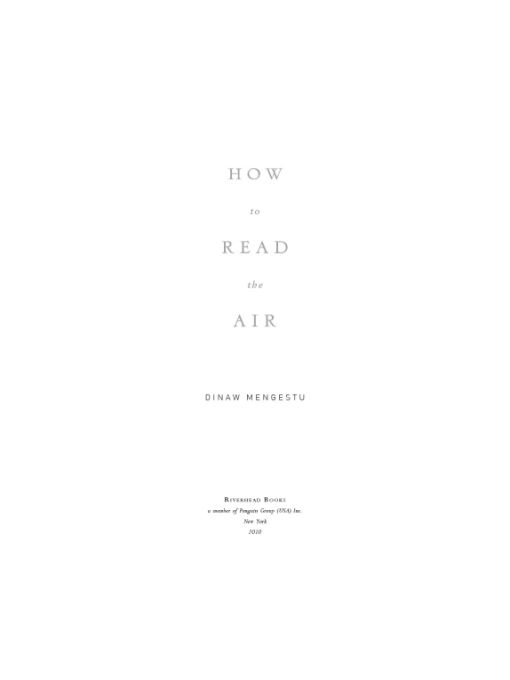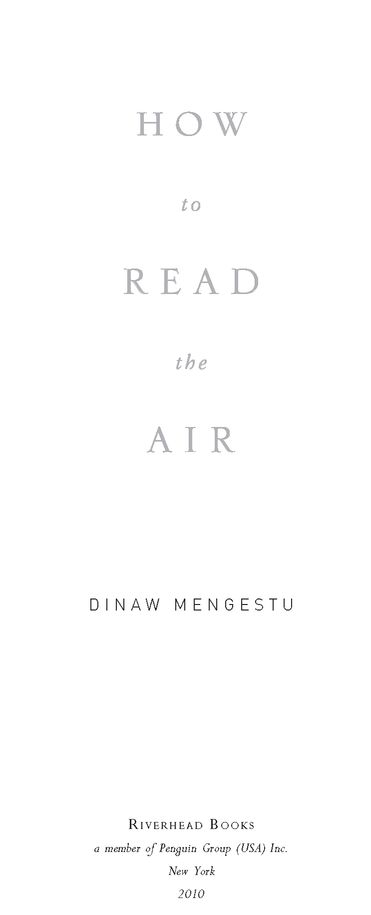Table of Contents
ALSO BY DINAW MENGESTU
The Beautiful Things That Heaven Bears
For Anne-Emmanuelle, pour toutes les belles choses
You still dont understand? Throw the emptiness in your arms out into that space we breathe; maybe birds will feel the air thinning as they fly deeper into themselves.
RAINER MARIA RILKE, Duino Elegies
PART I
I
It was four hundred eighty-four miles from my parents home in Peoria, Illinois, to Nashville, Tennessee, a distance that in a seven-year-old red Monte Carlo driving at roughly sixty miles an hour could be crossed in eight to twelve hours, depending on certain variables such as the number of road signs offering side excursions to historical landmarks, and how often my mother, Mariam, would have to go to the bathroom. They called the trip a vacation, but only because neither of them was comfortable with the word honeymoon, which in its marrying of two completely separate words, each of which they understood on its own, seemed to imply when joined together a lavishness that neither was prepared to accept. They were not newlyweds, but their three years apart had made them strangers. They spoke to each other in whispers, half in Amharic, half in English, as if any one word uttered too loudly could reveal to both of them that, in fact, they had never understood each other; they had never really known who the other person was at all.
Learning a new language was, in the end, not so different from learning to fall in love with your husband again, Mariam thought. While standing in front of the bathroom mirror early in the morning, she often told herself, in what she thought of as nearly flawless diction, Men can be strange. Wives are different. It was an expression she had heard from one of the women at the Baptist church that she and her husband had begun attending. A group of women were standing in the parking lot after the sermon was over, and one of them had turned to Mariam and said, Men can be so strange. Wives are just different.
At the time she had simply repeated the words back, almost verbatim, Yes. That is true. Men can be strange, because that was the only way that she could be certain that what she said was understood by everyone. What she would have liked to say was far more complicated and involved a list of sizable differences that by any other standards would have been considered irreconcilable. Regardless, since arriving in America six months earlier, she had pushed herself to learn new things about her husband, like why, for example, he spoke to himself when no one seemed to be looking, and why some days, after coming home from work, he would sit parked in the driveway for an extra ten or twenty minutes while she watched him from behind the living room curtains. On some nights he would wake up and leave the bedroom, careful not to rouse her but always failing because most nights Mariam hardly slept at all. He would lie down on the couch in the living room naked, and from the bedroom she would eventually hear him let out a small whimper followed by a grunt, and he would return to bed and sleep soundly until the morning. My mother learned these things and filed them into a corner of her brain that she thought of as being specifically reserved for facts about her husband. And in just the same way, she pushed herself to try new words and form new sentences in English, because just as there was a space reserved for her husband, there was another for English, and another one for foreign foods, and another for the names of streets near her house. She learned to say, It was a pleasure to meet you. And she learned individual words, like scattered and diligent and sarcastic. She learned the past tense. For example, I was tired yesterday, instead of: I am tired yesterday, or Yesterday tired I am. She learned that Russell Street led to Garfield Street, which would then take you to Main Street, which you could follow to I-74, which could take you east or west to anywhere you wanted to go. Eventually they would all make sense. Verbs would be placed in the right order, sarcasm would be funny, the town would be familiar: past, present, future, and husband, they could all be understood if given enough patience.
At this point in their marriage they had spent more time apart than together. She added up the days by rounding up some months, rounding down a few others. For every one day they had spent together, 3.18 had been spent apart. To her, this meant a debt had to be repaid, although who owed the other what remained unclear. Is it the one who gets left behind who suffers more, or is it the one whos sent out alone into the world to forage and create a new life? She had always hated numbers, but since most of the English she heard still escaped her, she now took comfort in them and searched for things to add. At the grocery store she calculated the cost of everything she brought to the register before she got there: a can of peas, seventy-eight cents; a package of salt, forty-nine cents; a bag of onions, forty cents. The smiling faces behind the register always offered a few words out loud before saying the total. All of them were lost on her, but what difference did it make if she didnt know how to take a compliment, banter, or understand what the phrase two-for-one meant. She knew the number at the end, and that number, because it didnt need translation, was power, and the fact that she knew it as she went up to the register filled her with a sense of accomplishment and pride unlike anything she had known since coming here. It made her feel, in its own quiet fleeting way, as if she were a woman to be reckoned with, a woman whom others would someday come to envy.
She never knew what her husband had gone through in the three years they had been apart, nor had she ever really tried to imagine. Say America enough times, try to picture it enough times, and you end up with a few skyscrapers stuck in the middle of a cornfield with thousands of cars driving around. The one picture she had received during those three years was of him sitting in the drivers seat of a large car, the door open, his body half in the car, half out. He kept one arm on the steering wheel, the other balanced on his leg. He looked handsome and dignified, his mustache neatly trimmed, his thick curly hair sculpted into a perfect ball that highlighted the almost uncanny resemblance his head had to the globe that her father kept perched on top of his chest of drawers.
When she first saw the picture she didnt believe the car was his. She thought he had found it parked on the side of the road and had seized the opportunity to show himself off, which was indeed almost exactly what he had done. Still, that didnt stop her from showing the picture to her mother, sisters, and girlfriends, or from writing on the back, in English: Yosef Car. She expected other pictures would eventually follow: pictures of him standing in front of a large house with a yard; pictures of him in a suit with a briefcase in hand; and then later, as the days, weeks, and months collided, and two years was quickly approaching three, she began to wait for pictures of him with his arm around another woman, with two young children at his side. She had secretly feared the latter would happen from the day he first left, because who had ever heard of a man waiting for his wife? The world didnt work that way. Men came into your life and stayed only as long as you could convince them to. She even named the children for him: the boy Adam and the girl Sarah, names that she would never have chosen for her own children because they were common and typical, and Mariams children, when they came, were going to be extraordinary.








